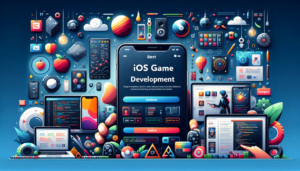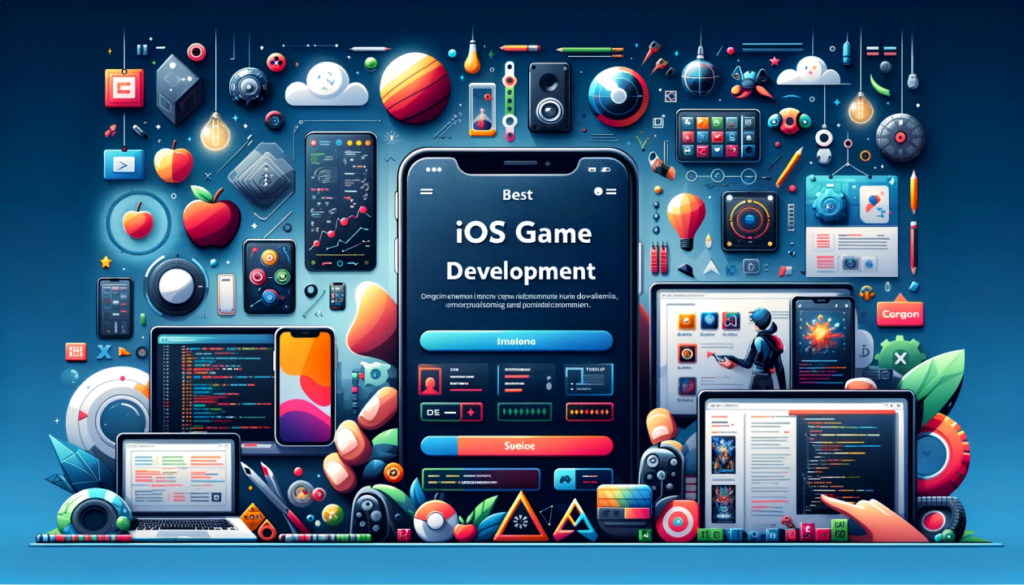iOS game development is becoming increasingly popular as the number of iOS users grows. However, developing an iOS game is difficult and can be very complicated.
This complexity can be attributed to various factors, including the technical skills required, the design and art requirements, the time and resources needed for development, and the strict guidelines imposed by Apple.
Additionally, developers must ensure their game works smoothly on multiple iOS devices and operating systems while creating an engaging user experience and finding effective monetization strategies. In this article, we will explore the factors contributing to the complexity of iOS game development.
Explanation Of IOS Game Development And Its Increasing Popularity.
IOS game development is the process of creating video games that are designed specifically for Apple’s iOS operating system. This includes games for iPhone, iPad, and iPod Touch devices.
With the increasing popularity of mobile gaming and the high adoption rate of iOS devices, iOS game development has become a lucrative field with immense growth potential. Mobile gaming has become a massive industry in recent years, with millions worldwide using their mobile devices to play games. Mobile gaming revenue is expected to reach $100 billion by 2021, and iOS devices account for a significant portion.
This popularity can be attributed to several factors, including the convenience of playing games on the go and the availability of a vast selection of games. The App Store, which is Apple’s online marketplace for iOS applications, is a significant contributor to the popularity of iOS game development.
The App Store is one of the most extensive app marketplaces globally, with millions of apps available for download. The App Store provides developers with an easy and accessible platform to market and distribute their games to a massive audience. Another factor contributing to the popularity of iOS game development is the iOS platform itself. iOS devices are known for their high-quality graphics and superior processing power, making them ideal for gaming.
The iOS operating system is also designed to be user-friendly, with a simple and intuitive interface that makes it easy for users to navigate and play games. IOS game development also offers significant revenue potential for developers. With the popularity of in-app purchases and the ability to monetize through ads, developers can generate a steady stream of income from their games.
Additionally, the App Store’s global reach means that developers can reach millions of users worldwide, increasing their revenue potential even further. The increasing popularity of iOS game development has also led to the industry’s growth as a whole. Many companies and independent developers are now focused solely on creating iOS games, leading to increased competition and innovation within the industry.
This competition has also led to the development of new tools and technologies to help developers create even more sophisticated and engaging games.
In conclusion, iOS game development has become increasingly popular due to the massive growth of mobile gaming, the availability of a vast audience on the App Store, and the superior capabilities of iOS devices. With the potential for significant revenue and the industry’s growth, iOS game development offers an exciting and lucrative field for developers to explore.

Requirements And Limitations Of Developing Games For Ios Devices
Developing games for iOS devices requires specific requirements and limitations that developers need to understand and adhere to. This is essential to ensure that games run smoothly on all iOS devices and meet Apple’s strict guidelines for the App Store.
One of the primary requirements for developing games for iOS devices is using the correct programming languages and software development kits (SDKs). iOS games are typically developed using Objective-C or Swift programming languages, and developers need to understand both well.
Additionally, developers need to be familiar with iOS-specific SDKs like SpriteKit, used for developing 2D games, and Metal, used for creating high-performance 3D games.
Another critical requirement for developing games for iOS devices is ensuring compatibility with multiple devices and operating systems. iOS devices come in various sizes and have different processing power and memory capacities, so developers need to optimize their games to run smoothly on all devices.
They also need to ensure that games are compatible with the latest iOS operating system and have backward compatibility with previous versions. Apple imposes strict guidelines for developers looking to publish games on the App Store, which can be seen as a limitation. These guidelines cover various aspects, including the game’s content, functionality, and Design.
Developers must ensure that their games meet these guidelines to be approved for the App Store. Guidelines also dictate what types of monetization strategies developers can use in their games, such as in-app purchases or advertising, which can limit their revenue potential. Another limitation is the cost of developing games for iOS devices. Developing games for iOS requires specialized tools and software, which can be costly. Hiring skilled iOS developers can also be expensive, adding to the overall development cost.
Lastly, developing games for iOS devices also requires developers to understand the user experience (UX) design principles. The UX design of games is critical to the game’s success, as it directly impacts the player’s engagement and satisfaction. Developers must consider various factors like gameplay mechanics, user interface design, and in-game rewards to create an engaging and immersive experience for players.
In conclusion, developing games for iOS devices requires specific requirements and limitations that developers must understand and adhere to. These include using the correct programming languages and SDKs, ensuring compatibility with multiple devices and operating systems, meeting Apple’s strict guidelines, and considering the development cost.
Additionally, developers must focus on UX design to create an engaging and immersive experience for players. Adhering to these requirements and limitations is essential to developing successful games for iOS devices.
Technical Skills Required To Develop Ios Games
Developing iOS games requires a specific set of technical skills developers must possess. These skills are essential to ensure that games run smoothly on iOS devices and meet Apple’s guidelines for the App Store. This article will discuss some of the key technical skills required to develop iOS games.
1. Programming Languages
IOS games are typically developed using Objective-C or Swift programming languages. Developers need to have a good understanding of both these languages to develop games for iOS devices.
Objective-C is an older language that has been used for a long time, while Swift is a newer, faster, and more efficient language. Developers need to know both languages to ensure compatibility with older and new iOS devices.
2. Software Development Kits (SDKs)
iOS games require specialized SDKs to develop games for iOS devices. Some popular SDKs used in iOS game development are SpriteKit, Metal, and Unity. SpriteKit is used for developing 2D games, Metal is used for creating high-performance 3D games, and Unity is used for creating cross-platform games.
3. Graphic Design
iOS games require high-quality graphics to create an immersive and engaging player experience. Developers need to understand graphic design principles and tools like Photoshop, Illustrator, and Sketch. They must know how to create 2D and 3D graphics, animations, and special effects.
4. Game Design
Game design is an essential technical skill required to develop iOS games. Developers need to understand game mechanics, user interface design, and in-game rewards to create an engaging and immersive experience for players. They must know how to create game levels, puzzles, and challenges that keep players engaged and interested.
5. Cross-Platform Development
Developing iOS games also requires developers to know about cross-platform development. Cross-platform development allows developers to create games that can run on multiple platforms like iOS, Android, and Windows. This requires knowledge of cross-platform development tools like Unity and Xamarin.

6. Optimization
Optimizing games for iOS devices is critical to ensure they run smoothly and efficiently. Developers must optimize their games for devices and operating systems, including older ones.
They must ensure that games run smoothly on devices with different screen sizes, resolutions, memory capacities, and processing power.
7. Debugging.
Debugging is an essential skill required for iOS game development. Developers need to know how to identify and fix bugs and errors in the code. They must have experience using debugging tools like Xcode to test and debug their games.
8. User Experience (UX) Design
UX design is another essential skill required for iOS game development. Developers need to know how to create an intuitive and engaging user interface that keeps players engaged and interested.
They must consider various factors like game mechanics, user interface design, and in-game rewards to create an immersive player experience.
9. Artificial Intelligence (AI)
AI is an increasingly important skill for iOS game development. Developers must know how to create intelligent and responsive game characters and enemies using AI.
They need to understand algorithms and data structures well to create intelligent game characters that respond to the player’s actions.
10. Cloud Integration.
Cloud integration is a technical skill required for iOS game development. Developers must know how to integrate their games with cloud services like iCloud, Game Center, and other third-party cloud services. This allows players to save their game progress and scores to the cloud, which can be accessed from multiple devices.
In conclusion, developing iOS games requires a specific set of technical skills developers must possess. These skills include programming languages, SDKs, Graphic Design, game design, cross-platform development, optimization, debugging, UX design, AI, and cloud integration. Developers need to master these skills to create.
The Design And Art Requirements For IOS Games
Design and art are critical components of iOS game development. The design and art requirements for iOS games go beyond creating visually appealing graphics. They involve designing an immersive game world and creating characters and objects that fit within it.
Designers need to understand game mechanics, user interface design, and in-game rewards to create an engaging experience for players. They need to know how to create game levels, puzzles, and challenges that keep players engaged and interested. They also need to consider the target audience for the game and ensure that the Design and art appeal to them.
On the other hand, artists need to understand 2D and 3D graphics, animation, and special effects well. They need to know how to create detailed character models, environments, and objects that fit within the game world. They also need to consider the technical limitations of iOS devices and ensure that the graphics and animations run smoothly on different devices.
In addition to these requirements, designers and artists need to work closely with developers to ensure that the game’s Design and art integrate seamlessly with the game’s code. They need to ensure that the game’s design and art elements are optimized for different devices and operating systems, including older ones. Overall, the design and art requirements for iOS games are essential for creating an immersive and engaging experience for players.
Apple’s Review Process
Apple’s review process is a crucial step in developing iOS games. Before an app can be published on the App Store, it must first pass through Apple’s rigorous review process. The review process ensures that apps meet Apple’s strict quality standards and do not pose any security or privacy risks to users.

The review process starts with the developer submitting the app for review. The app is then assigned to a team of experts who examine every aspect of the app. The experts check for bugs and glitches, ensure that the app follows Apple’s guidelines and policies, and test the app’s performance on different devices. The review process can take anywhere from a few days to several weeks, depending on the complexity of the app and the number of apps in the queue. If an app fails to meet Apple’s standards, it will be rejected, and the developer will be given feedback on how to address the issues.
One of the primary reasons for the review process is to ensure that apps do not pose any security or privacy risks to users. Apple has strict guidelines on how apps can access user data and what they can do. The review process ensures that apps do not violate these guidelines and that they do not contain any malicious code.
The review process also helps to maintain the quality of the App Store. By ensuring that only high-quality apps are published on the App Store, Apple can protect its reputation as a provider of premium apps. This, in turn, helps to attract more users to the App Store, which benefits both developers and Apple.
However, the review process can be frustrating for developers.
The process can be lengthy, and the feedback provided by Apple can be vague or difficult to understand. Developers may also disagree with the feedback provided by Apple or feel that their app has been unfairly rejected.
Despite these challenges, the review process remains essential to the iOS game development process. Apple can maintain its position as a leader in the mobile app market by ensuring that only high-quality, safe, and secure apps are published on the App Store.



